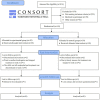Multi-domain computerized cognitive training for children with intellectual developmental disorder: A randomized controlled trial
- PMID: 36698581
- PMCID: PMC9868813
- DOI: 10.3389/fpsyg.2022.1059889
Multi-domain computerized cognitive training for children with intellectual developmental disorder: A randomized controlled trial
Abstract
Purpose: To verify the effects of multi-domain computerized cognitive training on intellectual function and adaptive functioning in children with intellectual developmental disorder (IDD).
Methods: Children with IDD were randomized to a multi-domain computerized cognitive training (CCT) group (n = 30) and control group (n = 30). Both groups received a 5-week training program. Intellectual function was assessed by Chinese-Wechsler Young Children scale (C-WYCSI) and adaptive functioning was assessed by the Chinese Vineland Adaptive Behavior Rating Scale (VABS-C), which were used at baseline, post-training, and 3-month follow-up.
Results: There were significant differences for intellectual function and adaptive functioning between the two groups. The CCT group showed significant improvements in total full-scale intelligence quotient (FSIQ) score the Wechsler Intelligence Scale (F[60] = 31.97, p < 0.01) and its subdomain VIQ score (F[60] = 33.83, p < 0.01). For adaptive functioning, CCT had a better adaptive developmental quotient (ADQ) score (F[60] = 28.05, p < 0.01), and subdomain communication (F[60] = 10.86, p < 0.01) and socialization scores (F[60] = 4.35, p < 0.015). Moreover, there was a positive correlation between FSIQ changes and ADQ changes in the CCT group (rs = 0.74, p < 0.01). A greater increase in VIQ score was associated with a greater increase in adaptive functioning (bootstrapping CI: [0.16, 3.30]) in the CCT group.
Conclusion: Multi-domain CCT improves the intellectual function and adaptive functioning of children with IDD.
Keywords: adaptive behavior; children rehabilitation; computerized cognitive training; intellectual developmental disorder; intellectual function.
Copyright © 2023 Wu, Peng, Li, Deng, Huang, He, Tu, Cao and Huang.
Conflict of interest statement
The authors declare that the research was conducted in the absence of any commercial or financial relationships that could be construed as a potential conflict of interest.
Figures





References
-
- American Psychiatric Association and American Psychiatric Association eds. (2013). Diagnostic and statistical manual of mental disorders: DSM-5. 5th ed. Washington, D.C: American Psychiatric Association.
-
- Camprodon-Rosanas E., Pujol J., Martinez-Vilavella G., Blanco-Hinojo L., Medrano-Martorell S., Batlle S., et al. . (2019). Brain structure and function in school-aged children with sluggish cognitive tempo symptoms. J. Am. Acad. Child Adolesc. Psychiatry 58, 256–266. doi: 10.1016/j.jaac.2018.09.441, PMID: - DOI - PubMed
LinkOut - more resources
Full Text Sources

